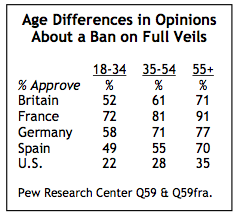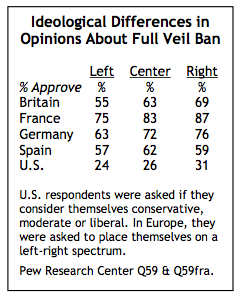
On July 13, members of the lower house of the French parliament are expected to vote on a bill that would make it illegal for Muslim women to wear full veils – those that cover all of the face except the eyes – in public places. A survey by the Pew Research Center’s Global Attitudes Project, conducted April 7 to May 8, finds that the French public overwhelmingly endorses this measure; 82% approve of a ban on Muslim women wearing full veils in public, including schools, hospitals and government offices, while just 17% disapprove.1
Majorities in Germany (71%), Britain (62%) and Spain (59%) would also support a similar ban in their own countries. In contrast, most Americans would oppose such a measure; 65% say they would disapprove of a ban on Muslim women wearing full veils in public places compared with 28% who say they would approve.
In the four Western European countries surveyed as well as in the U.S., support for a ban on Muslim women wearing a full veil is more pronounced among those who are age 55 and older, although majorities across all age groups in France, Germany and Britain favor a ban. For example, 91% of French respondents age 55 and older approve of restrictions on Muslim women covering their face, compared with 81% of those ages 35 to 54 and 72% of those younger than 35.

In Spain, where 70% in the older group and a narrower majority (55%) of those ages 35 to 54 favor a ban on full veils, younger respondents are closely divided; 49% of those ages 18 to 34 approve of such measures and 47% disapprove. In the U.S., about one-third (35%) of those in the oldest age group say they would welcome a ban on veils that cover the whole face except the eyes, while 28% of those ages 35 to 54 and just 22% of those younger than 35 say the same.
Opinions about banning Muslim women from wearing a full veil do not vary along gender lines in any of the five countries where the question was asked. In France, Britain and the U.S., views on this matter are also similar across education and income groups. However, in Spain and Germany, those in higher income groups are more likely than the less affluent to approve of such a ban; for example, a slim majority (51%) of low-income respondents in Spain favor a ban on full veils, compared with 62% of those in the middle-income range and 68% of those with high incomes.

Ideologically, those on the right in France, Britain and Germany are more likely than those on the left to approve of a ban on women wearing the full Islamic veil in public places, but majorities across the political spectrum in these countries endorse such a ban. In France, 87% of those on the right support prohibiting women from wearing full veils in public, and 75% of those on the political left agree. Spain is the only Western European country surveyed where those on both ends of the ideology scale express nearly identical views; 59% of those on the right and 57% of those on the left approve of a ban on Muslim women wearing veils that cover the whole face. Ideological differences are also insignificant in the U.S.




